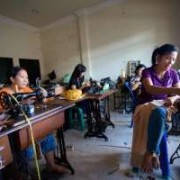Archive | October, 2015
Industry and trade
 Population, Social development and protection, Urban development
Population, Social development and protection, Urban development
 Social development and protection
Social development and protection
 Finance sector development
Finance sector development
 Economics, Energy
Economics, Energy

What next for the Trans-Pacific Partnership?

After more than 5 years of numerous missed self-imposed deadlines, trade ministers from the 12 participating Asia-Pacific countries finally concluded the Trans-Pacific Partnership (TPP) in Atlanta on 5 October 2015. The public fanfare accompanying the announcement led many to believe the agreement would soon come into force. Yet there is a lot that needs to be done before that happens, and there is no guarantee that it will. In this article, I examine two issues: (i) what concluding the TPP means in terms of what was achieved and what remains to be done; and (ii) what the TPP is likely to look like, given what we now know following the negotiations.
Housing policies for the PRC and Hong Kong, China: One nation, two systems

It has been reiterated that the People’s Republic of China (PRC) and Hong Kong, China are under different economic systems. The PRC is basically socialism with more planned economy features, while Hong Kong, China is basically capitalism with more free market features.
Monetizing housing for retirement in Singapore

In 2015, the value of housing assets owned by households in Singapore at the aggregate level was 55% of their net worth. Ninety percent of Singapore households owned their homes, meaning that almost all households had wealth saved in housing, and households’ housing wealth was 2.1 times that of the country’s gross domestic product.
4 ways to boost SME access to finance from commercial banks in ASEAN

Concerns about moderating economic growth and rising income inequality in ASEAN economies have brought small and medium-sized enterprises (SMEs) into the policy limelight. Arguing that SMEs have significant potential for creating jobs, some commentators are suggesting a host of industrial policies such as financial subsidies and local content rules to promote SMEs. However, government failure may result from heavy-handed state intervention for SMEs.
Do Japan’s oil consuming sectors still react to oil price movements?

Japan is almost fully dependent on energy imports. In March 2011, a devastating earthquake and tsunami hit eastern Japan and damaged the nuclear power plant in Fukushima. This disaster led to the shutdown of all nuclear power plants due to the lack of government safety approvals. Japan replaced this significant loss of nuclear power with energy generated from imported natural gas, low-sulfur crude oil, fuel oil, and coal.


Search
Subscribe / Connect to Asia Pathways
Subjects
- Agriculture and natural resources
- Blog
- Capacity development
- Climate change
- Economics
- Education
- Energy
- Environment
- Finance sector development
- Gender
- Governance and public sector management
- Health
- Industry and trade
- Information and Communications Technology
- Infrastructure
- Miscellaneous
- Population
- Poverty
- Private sector development
- Regional cooperation and integration
- Sanitation
- Social development and protection
- Transport
- Uncategorized
- Urban development
- Video Blog
- Water
Recent Posts
- Artificial intelligence: A new driver for inclusive growth and development?
- Increasing trust in cross-border e-commerce and artificial intelligence
- Enhancing access to maternal and newborn healthcare in developing Asia
- Can electric vehicles lead the way to a sustainable future?
- Mitigating climate-related sovereign risk to accelerate action on the climate emergency




Recent Comments